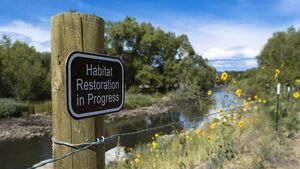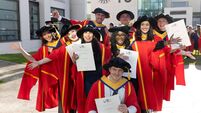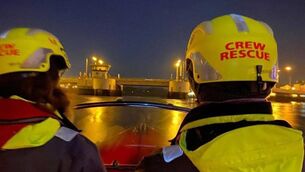Fr Liam Power: Incorporating the rights of nature into our Constitution

The most radical implication is that every living thing has its own intrinsic value.
A few weeks ago, Christians throughout the world celebrated the Feast of Pentecost. In the liturgy the Church, the People of God gave praise and worship to the Holy Spirit, identified in the Creed as the Lord, the Giver of Life. Eco and feminist theologians are leading us to a deeper appreciation of the Spirit’s presence and activity in our beautiful world.
They remind us that we are speaking of the Spirit of the living God, who is the source, the sustainer and goal of the whole evolutionary process that began with the Big Bang over 14 billion years ago. Christianity teaches that the Spirit is the creative power who dwells at the heart of our world sustaining every moment of its evolution. The Creator Spirit dwells at the heart of the natural world, energising its evolution from within. As such we affirm that the natural world is also a sacrament of the divine presence.
Physicist Stephen Hawking poses a famous question at the end of his brilliant book, “A Brief History of Time”: “What is it that breathes fire into the equations and makes a universe for them to describe?”
Hawking, as a committed atheist, leaves the question open. But Christians dare to believe that it is God’s own Spirit who breathes life into the equations and, according to eco-feminist theologian Elizabeth Johnson, “thereby bringing forth this exuberant universe”.
The Spirit is “the creative power who dwells at the heart of the world sustaining every moment of its evolution”.
Eco theologians have fostered this new consciousness, the new cosmic awareness of the divine presence.
Reflecting on this, I began to appreciate the enormous implications of this awareness. First of all, it means that the whole living earth as God’s beloved creation is deserving of care. If the earth is indeed the sacrament of divine presence, its ongoing destruction through ecocide or biocide is a deeply sinful desecration.
It means that Jesus' great command to love your neighbour as yourself extends to all of life. The neighbour is not just the ‘Samaritan', or the outcast but also the whale, the dolphin, the rain forest.
The most radical implication is that every living thing has its own intrinsic value.
This was perhaps the most radical claim made by Pope Francis in his groundbreaking document On Care for Our Common Home: “All creatures have intrinsic value in themselves, independent of their usefulness... Each organism as a creature of God is good and admirable in itself... so we must be attentive to all living systems so that we as humans and all other creatures can thrive on earth.”
But what more can we do to protect all forms of life on earth?
How about recognising that nature has rights and that such rights be incorporated into the Irish Constitution through a referendum. This radical move was proposed by Cliona Kimber SC at a conference here in Waterford recently.
Presenting a talk on the Constitutional rights for Nature and the Environment, she reminded us that the Citizens Assembly on Biodiversity Loss recommended people be asked to vote in a referendum advocating an amendment to our Constitution recognising the rights of nature.
The Oireachtas Joint Committee on Environment and Climate Action in a report published in December 2023 accepted in principle the recommendations of the Citizens Assembly.
Rather than approaching this radical concept in the abstract, Cliona asked the audience, “Should the River Suir and Suir Estuary have the same rights as people”?
She suggested that the Suir could be given “legal personality to protect its own interests of fishing, water quality, pollution, navigation and sailing rights”… and that the interests of the River Suir be looked after by an elected council or board of governors.
The granting of legal personality to rivers and lakes etc is happening in many areas of the world. Cliona gave examples from many countries. In 2017 an act of Parliament in New Zealand granted the whole Whanganui River rights as an independent entity, as part of the treaty settlement between the government and the Maori people.
Ecuador has incorporated rights of nature into its constitution. Because of that, Vilcabamba River, through its council, was able to take an action against a construction company, which was causing pollution in the river. The court ruled in favour of the river.
I would strongly support the idea of incorporating the rights of nature into Bunreacht na hÉireann.
More than this I would argue that all Christians should demand a referendum on this issue.
Reflecting on the exciting development in the theology of the Holy Spirit as outlined above and Pope Francis' formal recognition of the intrinsic value of all creatures and the ecological ethic that flows from this, surely it is the only way forward.






